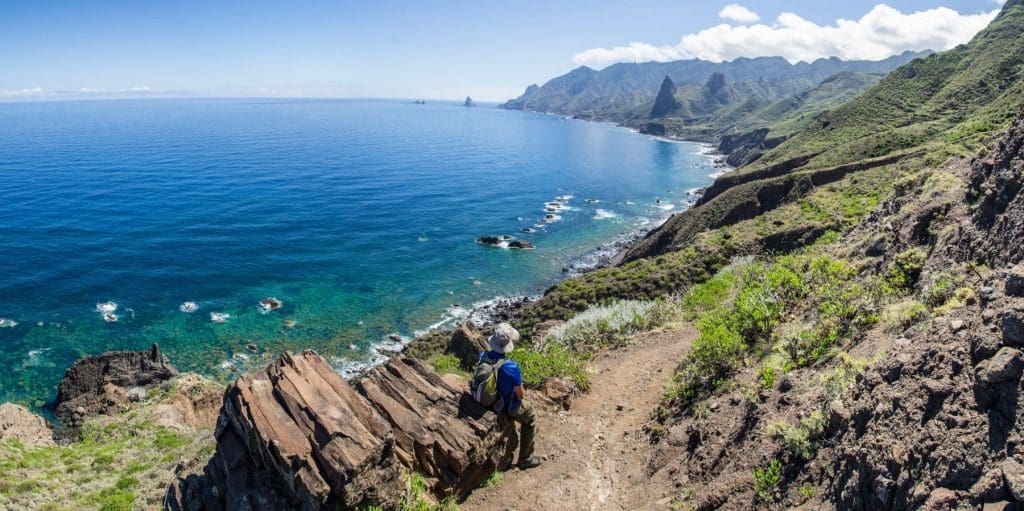Mark Bibby Jackson discovers the varied eco things to do in Tenerife so long as you are prepared to venture away from the beaches and bars.
Our Tenerife birdwatching guide Jean-Guy Le Roux informs us there is something special ahead. We clamber through Chio forest on Cascajo mountain, its bed covered with fresh pine needles. Pausing to take photos of the beautiful orange fruit of the Canary Island pine trees, Jean-Guy informs us that the islanders used to make mattresses out of the soft needles. Focusing my Swarovski Optik binoculars I spot a woodpecker in the distance. Nothing special there.
Eventually after ten or so more minutes Jean-Guy becomes excited and we all go hush. In the distance is a blue chaffinch. Not only is this beautiful bird endemic to Tenerife, but according to Jean-Guy it can only be spotted in this particular forest. Our eyes now accustomed to what we are seeking we spot a few other blue chaffinches flying in and out of the trees. We feel most fortunate.
1 Birdwatching in Tenerife
Earlier in the morning I had not felt so lucky as we traipsed out of our mini-bus in Teno rural park as the rain descended upon us.
Undressed for the occasion, my feet slowly dampening from the steady drizzle, we walk along a rural park, spotting rock doves, a partridge, some robins and most impressively a couple of canaries, their bright yellow colour illuminating the greyish day. It was the first time I had used my binoculars, and I was immediately struck by how the high quality lenses improved my birdwatching experience. Not only were the colours more vivid, but the birds were so much easier to spot.
Jean-Guy is in a mood philosophical.
“Mass tourism is not what we need,” says Jean-Guy who originally hails from Brittany and arrived at Tenerife some 16 years ago as a backpacker. He works as a ecotourism guide for various activities around the island, including birdwatching and, as I will discover a couple of days later, stargazing at Mount Teide. “We need people who are respectful to nature. We have too many people and they are not respectful.”
According to him, 42% of the island is protected, and there are more than 2,000 endemic species in Tenerife – there are 659 in the UK. Currently, there is a pair of ospreys nesting on Los Gigantes rocks in Teno natural park. There are lots of walking trails on the island but still people venture off the trails, something which annoys Jean-Guy, as the trails are there to protect the wildlife.
2 Organic Tenerife Wine Tasting
The following day we take the long, twisting road up the mountain to Ferrera Bodega, a vineyard in the south of the island. Situated some 1,000 metres above sea level in the middle of a lava flow, the vineyard’s very existence is a minor miracle.
A family business, Tomas Ferrera bought the farm in 1940 and built the dry stone walls himself, with help from his brother, when there was not even a road leading up the mountain. Now grandson Ruben runs the vineyard.
While pouring us a very presentable, dry rosé – “the perfect breakfast wine” – Ruben explains how the remotness of the vineyard works to its benefit. The four hectares of land are isolated by the lava from other properties, allowing them to avoid cross-contamination and preserve their organic status. The vineyard turned organic 15 years ago.
Ferrera Bodega makes five organic wines with their own grapes as well as other wines with grapes they buy. It is the only organic vineyard in the valley. Ruben says he could notice the improvement in both quality and taste since becoming organic. Also, all the wines are designation of origin Canary Island wines, which means they only use indigenous Canary Island grape varieties.
Ferrera has Tenerife wine tasting tours (€40) where the wines are paired with various tapas including on our visit local goat cheeses from Queseria Montesdeoca. These excellent cheeses varied from slightly salty to smoky were paired with an organic white wine, simply called Blanco Vin Ecologico, which has justifiably been voted the best organic wine in the Canaries for two years.
Our final wine was a youthful red wine, Tinto Joven, which was aged in an oak barrel, and had only been bottled 15 days prior to our visit. It went brilliantly with a cherry chocolate cake. This was an unforgettable slow tourism experience both for the quality of the local produce and the spectacular setting with unspoilt views down to the coast. The only pity was that we had not booked into their AirBnB Finca Ecological Ferrera to prolong our stay.
3 Stargazing on Mount Teide Tenerife
Our third ecological Tenerife activity took place the following night as we drove up Mount Teide to enjoy the stargazing.
Teide National Park was created in 1954. Each year some four million people visit it. Fortunately few remain for the night’s stargazing.
Our new guide José Antonio, who had taken us to Ferrera Bodega, assures us that the weather will be clear at the top of the mountain despite the rain cloud that consumes our bus throughout the ascent up the mountain. True to his word as we approach the top about 2,400 metres above sea-level, the cloud disappears, and we enter a lunar landscape that Salvador Dali could only have dreamt about.
According to José Antonio, this is the most similar landscape to Mars on Earth. The main volcano is Teide 2 which stands some 3,715 metres above sea-level. The first Teide blew its top hundreds of thousands of years ago to create the landscape valley in which we stand.
After dinner we wrap up well for a quick lesson from José Antonio on astronomy before taking it in turns to look at the constellations through specially assembled telescopes. Jean-Guy is in charge of one of them. Teide is an excellent spot for stargazing due to the lack of light pollution. It is a very levelling experience.
4 Visit an Eco Banana Plantation
On our final day we visit Banana Eco Plantation, which is the oldest banana plantation in Tenerife, dating back to 1880. Until the Second World War they exported exclusively to the UK. Now they export 150,000 kilos of bananas per year to Spain.
The plantation has been organic for ten years. They also produce honey from the many bees raised here to help with the pollination. The honey has a slight banana flavour.
Our guide Miguel explains the somewhat complex relationship with nature where certain insects are encouraged to breed so they can eat the other insects that are harmful to the banana tree, thus avoiding using pesticides. Clearly organic banana farming is an insect eats insect occupation. This is very much a circular economy with little waste; the older plants form the compost to feed the next generation of banana plants.
It takes nine months for a bunch of bananas to grow, the distinctive purple leaf is there to protect both the bananas and the flower which is external to the fruit. They average 150 bananas per bunch, all of which are sold to the local cooperative – only 6% of the bananas on the Canary Islands bananas are organic.
Miguel believes that organic bananas are healthier than non-organic, although he admits the taste is basically the same. Canary Island bananas have a great reputation on mainland Spain, despite being more expensive than other types of bananas.
After our visit we dined in the nearby El Calderito de la Abuela restaurant for some great traditional Tenerife food, including the ubiquitous Canary Island potatoes, and wonderful fruit and vegetables grown in their own organic garden. It had spectacular views down to the coast. This was the perfect conclusion to our visit to the island and discovering the eco things to do in Tenerife.
Eco Things to Do in Tenerife Photo Gallery
Flights to Tenerife
Mark flew with British Airways from London Gatwick to Tenerife (south) airport, offsetting his flight with Trees4Travel.
Hotels in Tenerife
If you are looking for a hotel for your Tenerife Holidays then you can do far worse than considering the two properties where we stayed. In the south of Tenerife we slept at the Hotel Sheraton La Caleta in Adeje, which was right on the coast. After this we travelled to the beautiful Hotel Botánico in Puerto de la Cruz in the north of the island.
Tenerife Weather
Choosing the right time for your Tenerife travel can be complex. Generally the weather in Tenerife can be divided into the north and south. Whereas the south of the island is really arid, the north is far greener, seeing far more rain.
Swarovski Optik
Mark used a pair of Swarovski Optik CL Companion 10 x 30 binoculars for his Teneriffe birdwatching trip. They really were brilliant and transformed the experience.
Further Information of Things to Do in Tenerife Spain
For more information on more things to do in Tenerife, click here.

